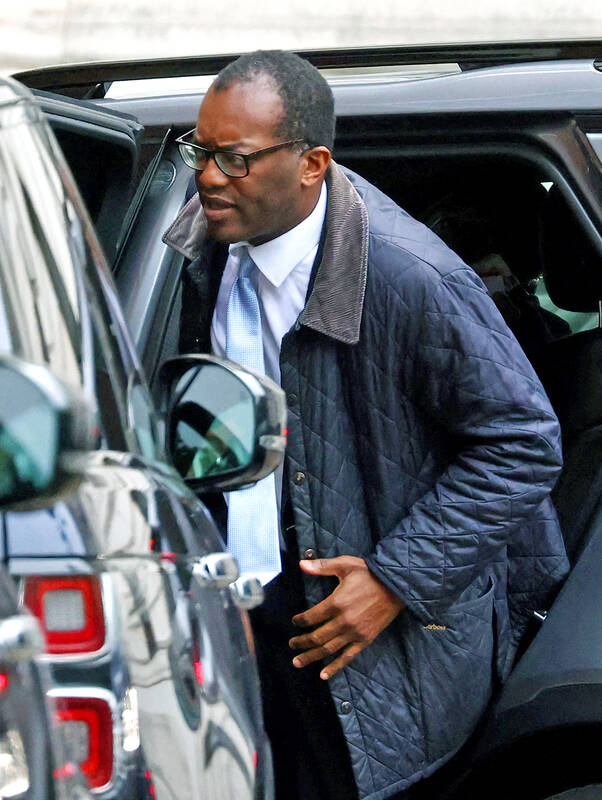British Prime Minister Liz Truss yesterday dismissed her finance minister, forcing Kwasi Kwarteng to carry the can for turmoil sparked by her economic platform as restive Conservatives plotted her own demise.
The chancellor of the exchequer was dismissed in person by Truss after he rushed back early from international meetings in Washington, multiple media reports said, and she was due later to hold her first Downing Street news conference.
There was no immediate announcement of his successor, who would become Britain’s fourth chancellor of the exchequer this year.

Photo: Reuters
Financial upheaval sparked by the new government’s Sept. 23 plan to slash taxes — financed via billions in more borrowing — has subsided somewhat since the Bank of England intervened in bond markets.
However, the central bank was adamant about ending its bond-buying spree yesterday, and market analysts said only a bigger climbdown by Truss following Kwarteng’s disastrous budget announcement last month would avert fresh panic.
No timing was given for Truss’s news conference, but the announcement underscored the sense of peril as some Conservative lawmakers reportedly mobilized to unseat the new leader just five weeks since she succeeded Boris Johnson.
Kwarteng was due to conclude annual meetings of the IMF and World Bank in Washington this weekend, after earning a rebuke from IMF managing director Kristalina Georgieva on the need for “coherent and consistent” policies.
Kwarteng confirmed his dismissal, posting his letter of resignation on Twitter.
“You have asked me to stand aside as your Chancellor. I have accepted,” Kwarteng wrote.
“It is important now as we move forward to emphasise your government’s commitment to fiscal discipline. The Medium-Term Fiscal Plan is crucial to this end, and I look forward to supporting you and my successor to achieve that from the backbenches,” he wrote.
Tony Travers, a professor at the London School of Economics, said that Kwarteng had been made “the fall guy for the government’s mistakes,” but the sacking had not taken the pressure off Truss or calmed the Conservatives.
“It’s very hard to see them coming back from this” by the next election, he added.
Speculation was rife that Truss would row back on planned changes to corporation tax, having already changed her mind about cutting income tax for the highest earners.
The promised tax cuts were the centrepiece of Truss’s successful pitch to Conservative party members that she, rather than rival Rishi Sunak, was the best candidate to replace Johnson. That program now lies in tatters, and Truss’ judgement is in question more than ever, after Sunak’s warnings were entirely vindicated: Higher borrowing to pay for tax cuts served only to terrify the markets and drive up borrowing costs for millions of Britons.

RUN IT BACK: A succesful first project working with hyperscalers to design chips encouraged MediaTek to start a second project, aiming to hit stride in 2028 MediaTek Inc (聯發科), the world’s biggest smartphone chip supplier, yesterday said it is engaging a second hyperscaler to help design artificial intelligence (AI) accelerators used in data centers following a similar project expected to generate revenue streams soon. The first AI accelerator project is to bring in US$1 billion revenue next year and several billion US dollars more in 2027, MediaTek chief executive officer Rick Tsai (蔡力行) told a virtual investor conference yesterday. The second AI accelerator project is expected to contribute to revenue beginning in 2028, Tsai said. MediaTek yesterday raised its revenue forecast for the global AI accelerator used

Taiwan Semiconductor Manufacturing Co (TSMC, 台積電) has secured three construction permits for its plan to build a state-of-the-art A14 wafer fab in Taichung, and is likely to start construction soon, the Central Taiwan Science Park Bureau said yesterday. Speaking with CNA, Wang Chun-chieh (王俊傑), deputy director general of the science park bureau, said the world’s largest contract chipmaker has received three construction permits — one to build a fab to roll out sophisticated chips, another to build a central utility plant to provide water and electricity for the facility and the other to build three office buildings. With the three permits, TSMC

TEMPORARY TRUCE: China has made concessions to ease rare earth trade controls, among others, while Washington holds fire on a 100% tariff on all Chinese goods China is effectively suspending implementation of additional export controls on rare earth metals and terminating investigations targeting US companies in the semiconductor supply chain, the White House announced. The White House on Saturday issued a fact sheet outlining some details of the trade pact agreed to earlier in the week by US President Donald Trump and Chinese President Xi Jinping (習近平) that aimed to ease tensions between the world’s two largest economies. Under the deal, China is to issue general licenses valid for exports of rare earths, gallium, germanium, antimony and graphite “for the benefit of US end users and their suppliers

Dutch chipmaker Nexperia BV’s China unit yesterday said that it had established sufficient inventories of finished goods and works-in-progress, and that its supply chain remained secure and stable after its parent halted wafer supplies. The Dutch company suspended supplies of wafers to its Chinese assembly plant a week ago, calling it “a direct consequence of the local management’s recent failure to comply with the agreed contractual payment terms,” Reuters reported on Friday last week. Its China unit called Nexperia’s suspension “unilateral” and “extremely irresponsible,” adding that the Dutch parent’s claim about contractual payment was “misleading and highly deceptive,” according to a statement